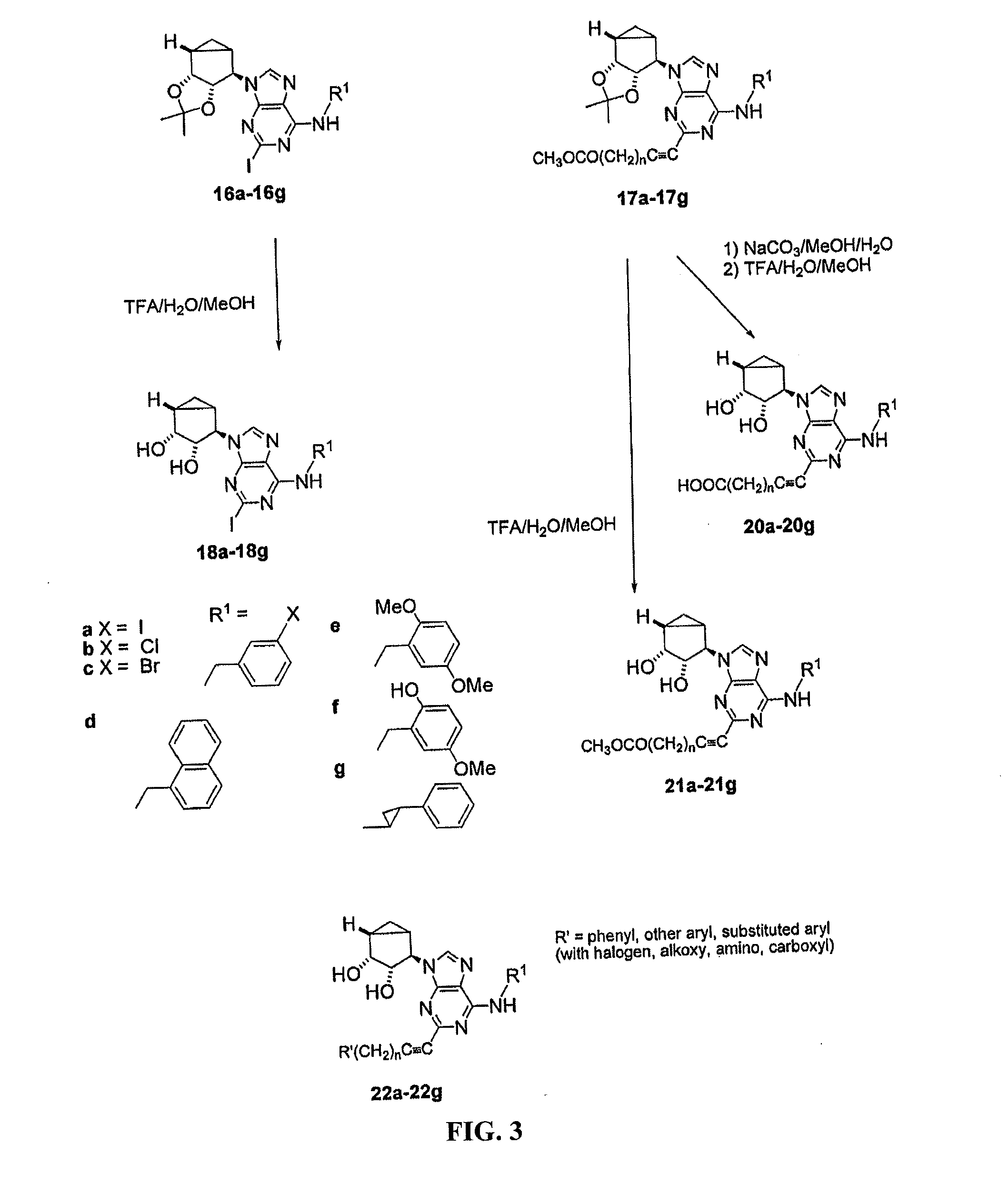Adenosine receptor agonists, partial agonists, and antagonists
a technology of adenosine receptor and adenosine receptor, which is applied in the field of adenosine receptor agonists, partial agonists, and antagonists, can solve the problems of lack of activation of the asub>3/sub>adenosine receptor, and achieve the effect of high potency and selectivity
- Summary
- Abstract
- Description
- Claims
- Application Information
AI Technical Summary
Benefits of technology
Problems solved by technology
Method used
Image
Examples
example 1
[0099]This example demonstrates a method of preparing compounds in accordance with an embodiment of the invention. D-ribose was protected with TBDPS-Cl followed by alkaline hydrolysis, thus providing acid 2. Reductive decarboxylation of acid 2 was carried out using non-toxic tris(trimethylsilyl)silane as a hydrogen donor and produced the silyl ether 3 in 40% yield. The silyl ether 3 was deprotected with TBAF. The resultant alcohol 4 was converted into a key dichloropurine derivative 6 through a Mitsonobu reaction (FIG. 1). Derivative 6 reacted with an excess of the corresponding primary amine to give the N6 substituted and 2′,3′-isopropylidene protected derivatives compounds 7a-13a, followed by acid catalyzed deprotection to give the N6-3-halobenzyl and related arylmethyl derivatives 7b-13b.
(1R,2S,3R,4R,5R)-3,4-O-(Isopropylidene)-2-O-(tert-butyldiphenylsilyl)-2,3,4-trihydroxybicyclo[3.1.0]hexane-1-carboxylic acid (2).
[0100]tert-Butyldiphenylsilyl chloride (2.70 g, 10 mmol) and triet...
example 2
[0112]This Example illustrates the ability of the compounds in accordance with an embodiment of the invention to bind to A3 adenosine receptors. The binding affinity values are set forth in Table 1.
Receptor Binding and Functional Assays
[0113][125 I]N6-(4-Amino-3-iodobenzypadenosine-5′-N-methyluronamide (1-AB-MECA; 2000 Ci / mmol), [3H]cyclic AMP (40 Ci / mmol), and other radioligands were purchased from Perkin-Elmer Life and Analytical Science (Boston, Mass.). [3H]CCPA (2-chloro-N6-cyclopentyladenosine) was a custom synthesis product (Perkin Elmer). Test compounds were prepared as 5 mM stock solutions in DMSO and stored frozen.
[0114]Cell culture and membrane preparation: CHO (Chinese hamster ovary) cells expressing the recombinant human A3AR were cultured in DMEM (Dulbecco's modified Eagle's medium) supplemented with 10% fetal bovine serum, 100 units / mL penicillin, 100 μg / mL streptomycin, 2 μmol / mL glutamine and 800 μg / mL geneticin. The CHO cells expressing rat A3ARs were cultured in DM...
example 3
[0124]This example illustrates a method of preparing a radioiodinated compound in accordance with an embodiment of the invention. Compound 7b having 125I was prepared as follows. The (radio)iodination of compound 7b on its N6-3-iodobenzyl substituent was accomplished in high yield by iododestannylation of a 3-(trimethylstannyl)benzyl precursor through a “cold” iodination reaction as shown in FIG. 6.
[0125]Materials and instrumentation.
[0126]Hexamethyltin and other reagents, including pharmacological agents, were purchased from Sigma-Aldrich Chemical Company, except where noted. Sodium[125I]iodide (17.4 Ci / mg) in NaOH (1.0×10−5M) was supplied by Perkin-Elmer Life and Analytical Science. 1H NMR spectra were obtained with a Varian Gemini 300 spectrometer using CDCl3 and CD3OD as solvents. Chemical shifts are expressed in δ values (ppm) with tetramethylsilane (δ□0.00) for CDCl3 and water (δ 3.30) for CD3OD. TLC analysis was carried out on aluminum sheets precoated with silica gel F254 (0...
PUM
 Login to View More
Login to View More Abstract
Description
Claims
Application Information
 Login to View More
Login to View More - R&D
- Intellectual Property
- Life Sciences
- Materials
- Tech Scout
- Unparalleled Data Quality
- Higher Quality Content
- 60% Fewer Hallucinations
Browse by: Latest US Patents, China's latest patents, Technical Efficacy Thesaurus, Application Domain, Technology Topic, Popular Technical Reports.
© 2025 PatSnap. All rights reserved.Legal|Privacy policy|Modern Slavery Act Transparency Statement|Sitemap|About US| Contact US: help@patsnap.com



